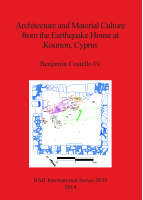Description
BOOK DESCRIPTIONIn the late 4th century AD, the site of Kourion, Cyprus was destroyed by an earthquake that struck with little or no warning, trapping victims and objects where they lay. Although much of the site was reoccupied and rebuilt, some areas were not, thus providing a unique example of a moment truly frozen in time. This work presents the results of a comprehensive study of the architecture, stratigraphy, and material culture assemblage recovered from the Earthquake House, a multi-roomed domestic structuredestroyed during this seismic event. The architectural analysis revealed a number of modifications to the structure that increased its overall size and subdivided its internal spaces, although their timing and reasons remain unknown at present. Study of the artifact assemblage provided significant insights into the processes surrounding the use, re-use, and discard of artifacts. This analysis identified numerous behaviors including consumable and non-consumable storage, storage of material for reuse and/or recycling, food preparation, and waste disposal, including a partial reconstruction of the domestic waste stream. This study produced a more nuanced model for understanding the distribution of artifacts in ancient domestic contexts and demonstrates that even in cases of near instantaneous destruction without significant disturbance, a wide variety of variables must be considered when examining the artifacts of domestic assemblages.











